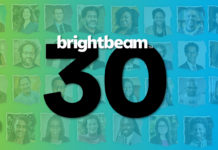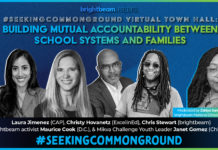Citizen Ed recently gathered experts and leaders from across the political spectrum to discuss what we need to do to protect students’ privacy during an era of increasing data collection at school.
Brightbeam’s national director of activism Zakiya Sankara-Jabar hosted Marika Pfefferkorn of the Twin Cities Innovation Alliance, Paige Kowalski of the Data Quality Campaign, Oakland education activist Kareem Weaver, and Chicago-based brightbeam activist Natasha Dunn. All brought truth, empathy, and endless practical solutions to keep our kids safe from identity theft and other kinds of digital harm as their schools track their performance with online measures created largely by third parties.
Watch the full episode below or over at our Facebook page.
We’re Very Behind the Technology Curve
Despite tons of legitimate concerns about how students’ data is collected, the panel of experts urged viewers to not see “data” as a dirty word. It’s implementing proper data collection practices where things get tricky.
Thankfully, guests had examples of solutions that have worked in smaller communities across the country that should be made available to the rest of us.
Pfefferkorn said schools must approach parents and establish a shared understanding of what data is being collected about their kids, and how they’re being protected.
“We need to have a foundational data literacy,” she said. This means being clear with families, not hand waving away any concerns they have or assuming it’s too complicated for them to understand.
Dunn agreed on a parents-first approach.
“Building trust is one of the primary ways to bring parents into the conversation,” she said. “There has to be acknowledgement of past failures in student support and student achievement.”
There are some laws passed both nationally and locally that can protect some families from the harm of third-party data collectors sharing their kids’ data with various businesses. The problem, Kowalski says, is it’s a “patchwork of policies.”
More importantly, these laws are way behind the technologies of the time and require a big rethink at the policymaking level.
“Our technologies are emerging faster than our policies are keeping pace,” Pfefferkorn noted. Also, leaders at every level need to be brought up to date on what these technologies are capable of doing, because too many have not kept up with modern tech.
After all, as Kowalski pointed out, “There is no federal requirement in the land that people who have access to identifiable information be trained.”
Why Data Gathering Is So Important
Weaver, a fierce advocate and changemaker for kids in Oakland for decades, and his family recently learned their daughter’s education has been made exponentially more difficult because nobody had gathered data in the first place when she was young.
“My 16-year-old daughter was screened and learned she has dyslexia two weeks ago. I wish she had been screened at 6, at 7,” he said.
Dunn continued in that vein.
“Data can be a useful tool, depending on who’s using the tool,” she said.
So what are the kinds of data that most help students without exposing them to identity theft, future harm done by labels placed on them digitally as children, and other issues?
Kowalski laid it out.
“What are the factors for every student that lead to graduation?” she said. “Is that student currently on track? If they are not on track, what are we going to do to get them on track? And everyone’s at the table.”
Weaver continued preaching clarity from school officials to parents during this process Kowalski suggests.
“Our intentions matter,” he said. “We have to be clear about our goals and that will tell us what we need. Gotta make sure our kids aren’t being exploited.”
Be sure to follow Citizen Ed on YouTube and like us on Facebook so you never miss an episode of #SeekingCommonGround.










